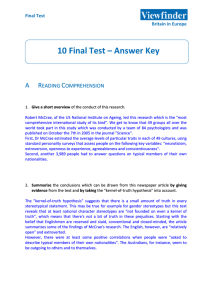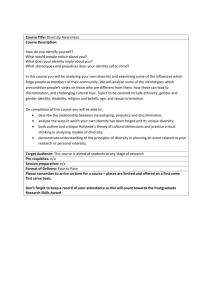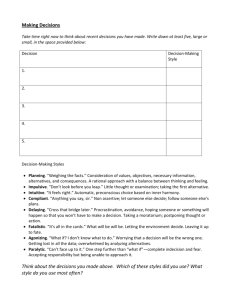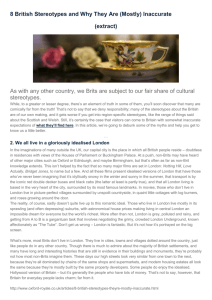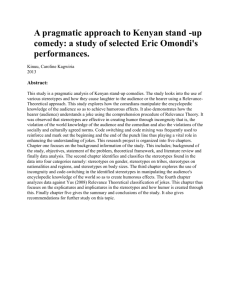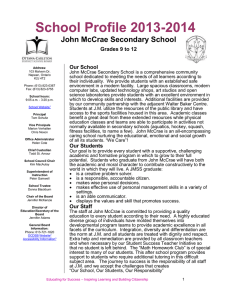2. Schulaufgabe
advertisement
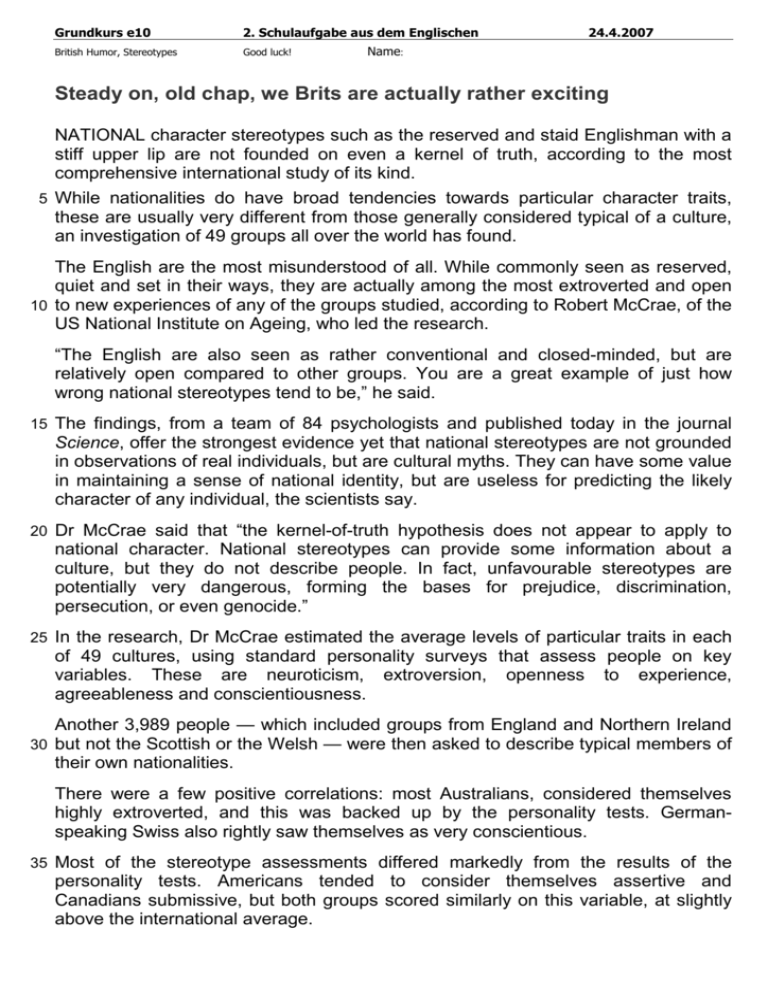
Grundkurs e10 2. Schulaufgabe aus dem Englischen British Humor, Stereotypes Good luck! 24.4.2007 Name: Steady on, old chap, we Brits are actually rather exciting NATIONAL character stereotypes such as the reserved and staid Englishman with a stiff upper lip are not founded on even a kernel of truth, according to the most comprehensive international study of its kind. 5 While nationalities do have broad tendencies towards particular character traits, these are usually very different from those generally considered typical of a culture, an investigation of 49 groups all over the world has found. The English are the most misunderstood of all. While commonly seen as reserved, quiet and set in their ways, they are actually among the most extroverted and open 10 to new experiences of any of the groups studied, according to Robert McCrae, of the US National Institute on Ageing, who led the research. “The English are also seen as rather conventional and closed-minded, but are relatively open compared to other groups. You are a great example of just how wrong national stereotypes tend to be,” he said. 15 The findings, from a team of 84 psychologists and published today in the journal Science, offer the strongest evidence yet that national stereotypes are not grounded in observations of real individuals, but are cultural myths. They can have some value in maintaining a sense of national identity, but are useless for predicting the likely character of any individual, the scientists say. 20 Dr McCrae said that “the kernel-of-truth hypothesis does not appear to apply to national character. National stereotypes can provide some information about a culture, but they do not describe people. In fact, unfavourable stereotypes are potentially very dangerous, forming the bases for prejudice, discrimination, persecution, or even genocide.” 25 In the research, Dr McCrae estimated the average levels of particular traits in each of 49 cultures, using standard personality surveys that assess people on key variables. These are neuroticism, extroversion, openness to experience, agreeableness and conscientiousness. Another 3,989 people — which included groups from England and Northern Ireland 30 but not the Scottish or the Welsh — were then asked to describe typical members of their own nationalities. There were a few positive correlations: most Australians, considered themselves highly extroverted, and this was backed up by the personality tests. Germanspeaking Swiss also rightly saw themselves as very conscientious. 35 Most of the stereotype assessments differed markedly from the results of the personality tests. Americans tended to consider themselves assertive and Canadians submissive, but both groups scored similarly on this variable, at slightly above the international average. Grundkurs e10 2. Schulaufgabe aus dem Englischen British Humor, Stereotypes Good luck! 24.4.2007 Name: Czechs thought of their nationality as antagonistic and disagreeable, when the 40 research found them to be among the friendliest of all cultures. Indians thought themselves highly open to experience, when the personality data suggested that they were more conventional than the rest of the world. Dr McCrae now plans to lead a similar investigation of attitudes towards the elderly. “We are all prone to these kinds of preconceptions and likely to believe that they are 45 justified by our experience, when in fact they are often unfounded stereotypes,” he said. “We need to see people as individuals, whether they are Americans or Lebanese, Gen-Xers1 or senior citizens.” 534 words BY MARK HENDERSON, SCIENCE CORRESPONDENT 50 This text is slightly adapted from The Times, Oct 07, 2005 (http://www.timesonline.co.uk/article/0,,2-1815107,00.html) Text Production - Questions on and beyond the text Read the text and the questions carefully. Answer in complete sentences. Use your own words as far as possible. 1. Give a short overview of the conduct2 of this research. (20) 2. Summarize the conclusions which can be drawn from this newspaper article by giving evidence from the text and by taking the "kernel-of-truth hypothesis" (l. 20) into account. (20) 3. "Dr McCrae now plans to lead a similar investigation of attitudes towards the elderly." (l. 43) Give an example of a third possible area of investigating stereotypes and explain why you think that it suggests itself. (10) Composition - Choose one of the following topics. Write about 120 to 150 words. (20) 1. "If we were to wake up some morning and find that everyone was the same race, creed and color, we would find some other cause for prejudice by noon" (George Aiken). Discuss. 2. Prejudices will live forever. Discuss. 3. “Many foreigners [...] seriously believe that the English have little or no humour” (J.B. Priestley). — Do you agree with these foreigners? total: 70 BE 1 2 People born between 1963 and 1978 are generally considered "Generation X". conduct (E) = Durchführung (G) Grundkurs e10 2. Schulaufgabe aus dem Englischen British Humor, Stereotypes Good luck! 24.4.2007 Name: Text Production - Questions on and beyond the text Read the text and the questions carefully. Answer in complete sentences. Use your own words as far as possible. 1. Give a short overview of the conduct of this research. (20) Robert McCrae, of the US National Institute on Ageing, led this research which is the "most comprehensive international study of its kind" (ll. 3f.). We get to know that 49 groups all over the world took part in this study which was conducted by a team of 84 psychologists and published on October the 7th in 2005 in the journal "Science". On the one hand, Dr McCrae estimated the average levels of particular traits in each of 49 cultures, using standard personality surveys that assess people on the following key variables (cp. ll. 25 ff.): "neuroticism, extroversion, openness to experience, agreeableness and conscientiousness" (ll. 27 f.). On the other hand, another 3,989 people had to answer questions on typical members of their own nationalities. 2. Summarize the conclusions which can be drawn from this newspaper article by giving evidence from the text and by taking the "kernel-of-truth hypothesis (l.20) into account. (20) The "kernel-of-truth hypothesis" (l. 20) suggests that there is a small amount of truth in every stereotypical statement. This may be true e.g. for gender stereotypes but this text reveals that at least national character stereotypes are "not founded on even a kernel of truth" (l. 3), which means that there's not a bit of verity in these prejudices. Starting with the stamp that Englishmen are reserved and staid (cp. l. 2), conventional and closed-minded (cp. l. 12), the article summarizes some of the findings of McCrae's research. The English, however, are "relatively open" (l. 13) and extroverted (l. 9). However, there were at least some positive correlations when people were "asked to describe typical members of their own nationalities" (ll. 30 f.). The Australians, for instance, seem to be outgoing to others and to themselves. 3. "Dr McCrae now plans to lead a similar investigation of attitudes towards the elderly." (l. 43) Give an example of a third possible area of investigating stereotypes and explain why you think that it suggests itself. (10) Women don't know how to drive cars. Women are made for cleaning and taking care of their children. Men hate to go shopping. Men drink beer and watch soccer on TV in their free time. Having listed those stereotypes, it gets clear that a third possible area of investigation could be gender stereotypes. It suggests itself because these prejudices are a part of our every day lives, they are the basis of a high percentage of jokes and they definitely have a grain of truth in them. Composition - Choose one of the following topics. Write about 120 to 150 words. (20) 1. "If we were to wake up some morning and find that everyone was the same race, creed and color, we would find some other cause for prejudice by noon" (George Aiken). Discuss. 2. Prejudices will live forever. Discuss. 3. “Many foreigners [...] seriously believe that the English have little or no humour” (J.B. Priestley). — Do you agree with these foreigners? individual solution
